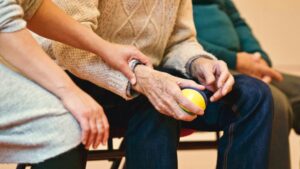As we age, falls and injuries become a growing concern, and can have serious consequences for our health and wellbeing. In fact, falls are the leading cause of injury and death among older adults in the United States, according to the Centers for Disease Control and Prevention (CDC). However, with the right strategies and preventative measures, seniors can reduce their risk of falls and injuries, and enjoy a better quality of life.
In this article, we will explore the causes of falls and injuries in seniors, and provide tips and strategies for staying safe and active.
Causes of Falls and Injuries in Seniors
Falls and injuries in seniors can be caused by a variety of factors, including:
-
Decline in physical function: As we age, our muscles and bones weaken, and our balance and coordination may decline. This can increase the risk of falls and injuries.
-
Chronic conditions: Chronic conditions such as arthritis, diabetes, and vision problems can affect mobility and balance, and increase the risk of falls and injuries.
-
Environmental hazards: Hazards such as clutter, poor lighting, and slippery surfaces can increase the risk of falls and injuries in seniors.
-
Medication side effects: Some medications can cause dizziness or other side effects that increase the risk of falls and injuries.
Tips for Preventing Falls and Injuries in Seniors
Here are some tips and strategies for preventing falls and injuries in seniors:
-
Exercise regularly: Seniors should engage in exercises that help improve their balance, coordination, and strength. This can include activities such as yoga, walking, strength training, or tai chi. These exercises help improve mobility and prevent falls by building strength in the muscles and improving balance.
-
Maintain a healthy diet: Seniors should ensure that their diet includes a variety of foods that provide essential nutrients for maintaining strong bones and muscles. Foods high in calcium, vitamin D, and protein are particularly important. Seniors should also avoid excessive alcohol consumption as this can increase the risk of falls and injuries.
-
Review medications: Seniors should review all medications they are taking with their doctor or pharmacist. Some medications can cause dizziness, confusion, or balance problems, which can increase the risk of falls and injuries.
-
Remove environmental hazards: Seniors should make changes to their living environment to remove hazards that could cause falls or injuries. This may include removing clutter, fixing loose rugs or floorboards, and installing handrails or grab bars in the bathroom.
-
Use assistive devices: Seniors who have difficulty walking or maintaining their balance should use assistive devices such as a cane, walker, or wheelchair. These devices can provide stability and support, and help prevent falls.
-
Stay hydrated: Seniors should drink plenty of fluids, especially during hot weather or when engaging in physical activity. Dehydration can cause dizziness and increase the risk of falls.
-
Get regular check-ups: Seniors should get regular check-ups with their healthcare provider. This includes regular eye exams and hearing tests, as well as periodic evaluations for any chronic conditions that may affect mobility or balance.
-
Wear appropriate footwear: Seniors should wear comfortable and supportive shoes with non-slip soles. High heels or shoes with slick soles can increase the risk of falls and injuries.
-
Stay socially active: Staying socially active and engaged can help improve mental wellbeing and reduce the risk of falls and injuries. Seniors should participate in activities such as community events, hobbies, and social clubs.
-
Consider physical therapy: Physical therapy can be a valuable tool for seniors who are at risk of falls and injuries. A physical therapist can design a personalized exercise program to help improve balance, coordination, and strength, and provide instruction on the safe use of assistive devices.
Falls and injuries in seniors are a growing concern, but with the right preventative measures, seniors can reduce their risk and stay safe and active. By staying physically active, maintaining a healthy diet, reviewing medications, removing environmental hazards, using assistive devices, staying hydrated, getting regular check-ups, wearing appropriate footwear, staying socially active, and considering physical therapy, seniors can enjoy a better quality of life and reduce the risk of falls and injuries.
Read also: UTI in Older Adults: Causes, Symptoms, and Prevention





